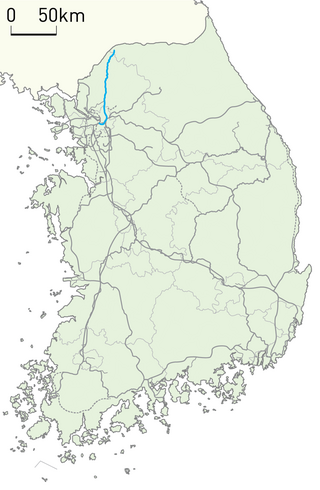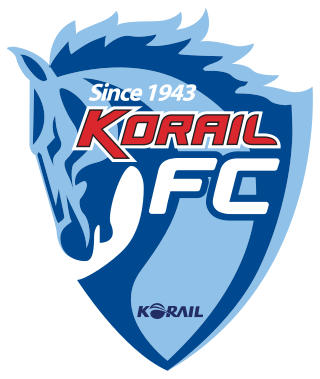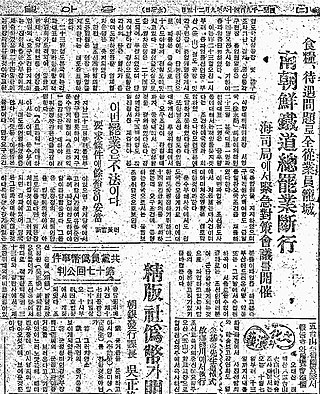
The Korea Railroad Corporation is the national railway operator in South Korea. It is branded as KORAIL (코레일) and changed its official Korean name in November 2019. Currently, KORAIL is a public corporation, managed by Ministry of Land, Infrastructure and Transportation.
The Korean Confederation of Trade Unions (KCTU), literally translated as National Confederation of Democratic Trade Unions, also known as Minju-nochong, is a national trade union centre in South Korea officially established in 1995. Its predecessor was the National Council of Trade Unions (NCTU), established in 1990 as an independent, democratically operated alternative to the Federation of Korean Trade Unions.

The Gyeongwon Line is a railway line serving northeastern Gyeonggi Province in South Korea. The line is operated by Korail. The name of the line came from Gyeongseong (Seoul) and Wonsan, the original terminus of the line, in what is now North Korea.

Korea Train eXpress (Korean: 한국고속철도), often known as KTX, is South Korea's high-speed rail system, operated by Korail. Construction began on the high-speed line from Seoul to Busan in 1992. KTX services were launched on April 1, 2004.

Hyundai Rotem Co. is a South Korean company that manufactures rolling stock, defense products and plant equipment. It is a part of the Hyundai Motor Group. Its name was changed from Rotem to Hyundai Rotem in December 2007 to reflect the parent company. It is also called Hyundai Railroad Technology Systems.
The South Korean railroad strike of 2006 was a four-day walkout by members of the Korean Railway Workers' Union employed by the Korean National Railroad. It lasted from March 1 to March 4, when the union called a halt to the strike after most of the workers voluntarily returned to work. The number of striking workers fluctuated throughout the strike, but reached over 16,000 workers at its peak. During the strike, Korail's passenger service was decreased by 60%, on both national and Seoul Subway lines. Freight service was also greatly reduced.

AREX is a South Korean airport rail link and commuter rail line that links Incheon International Airport with Seoul Station via Gimpo International Airport.

Korea National Railway is a railroad construction and management company in South Korea formed by the merger of KNR Construction Headquarters and Korean Express Railroad Construction Corporation. Its main clients are Korail. It is a subsidiary of the Ministry of Land, Infrastructure and Transport.

Daejeon Korail FC is a South Korean football club based in Daejeon that competes in the K3 League, the third tier of South Korean football league system. It is owned and operated by Korea Railroad Corporation, South Korea's national railroad operator. Their home venue is Daejeon Hanbat Sports Complex.

Railways are a part of the transport network in South Korea and an important mode of the conveyance of people and goods, though they play a secondary role compared to the road network. The network consists of 4,285 km (2,663 mi) of standard-gauge lines connecting all major cities with the exception of Jeju City on Jeju Island, which does not have railways; of the network, 2,790 km (1,730 mi) are double-tracked and 3,187 km (1,980 mi) are electrified. In 2018, rails carried 11.5 percent of all traffic in South Korea – 134.8 million passengers and 30.9 million tonnes of freight – with roads carrying 88.3 percent.

Cheongnyangni Station (Korean: 청량리역) is a major railway station located at Dongdaemun District, Seoul, South Korea. It serves as a terminus for passenger trains serving the eastern part of South Korea. KTX, ITX-Cheongchun, and Mugunghwa-ho trains terminate or stop at this station. Several Seoul Metropolitan Subway lines serve the station: Seoul Subway Line 1, the Gyeongchun Line, the Suin–Bundang Line and the Gyeongui–Jungang Line.

Cheonan–Asan station (Korean: 천안아산역) is a ground-level train station located mostly in Asan, South Chungcheong Province, South Korea, although part of it lies in the neighboring city of Cheonan. This station serves high-speed KTX trains that run from Seoul to either Busan or Mokpo. It is connected to Asan station, a railway station on the Janghang Line which is also served by Line 1 of the Seoul Subway.

The Gyeongbu high-speed railway, also known as Gyeongbu HSR, is South Korea's first high-speed rail line from Seoul to Busan. KTX high-speed trains operate three sections of the line: on 1 April 2004, the first between a junction near Geumcheon-gu Office station, Seoul and a junction at Daejeonjochajang station north of Daejeon, and a second between a junction at Okcheon station, southeast of Daejeon, and a junction near Jicheon station, north of Daegu entered service; then on 1 November 2010, the third section, between a junction west of Daegu and Busan became operational. The missing gaps across the urban areas of Daejeon and Daegu were in construction for an expected opening in 2014, separate tracks into Seoul Station were also planned. The temporary ends of the three sections were connected to the parallel conventional Gyeongbu Line by tracks that will serve as interconnector branches upon the completion of the entire line. On 1 August 2015, construction on urban areas of Daejeon and Daegu were completed; all the sections of HSR line were connected.

Asan Station is a railway station on the Janghang Line which is also served by Line 1 of the Seoul Subway. Its located in Baebang-eup, Asan, South Chungcheong Province, South Korea. Meanwhile, is served by all Saemaeul-ho and Mugunghwa-ho services on the Janghang Line.

Ilsan Line is a subway line operated by Korail, in Seoul, South Korea. Trains from this line continue to and from Seoul Metro's Line 3.
The Korean Railway Workers' Union (KRWU), also known as Cheoldo(-)nojo in Korean language, is a labor union of metal workers in South Korea. The KRWU was founded in March 1947 as the Transportation Ministry Association, affiliated with the Federation of Korean Trade Unions.

The South Korean KTX Train Attendant Union Strike was a strike conducted by the KTX female train attendants that began on March 1, 2006 in order to protest against the hiring practices of irregular workers. This was the beginning of the longest struggle in South Korea thus far, lasting over 1,000 days.
Women in Asia have been organizing to address workplace issues, such as unequal pay and workplace violence as early as the 1880s. The formation of women's labor unions in South Korea began in the late 1970s with the Minjung movement, as it is based on the mobilization of young female factory workers and martial law suspended labor rights. Women in South Korea are typically irregular workers, who are not protected by labor laws, make up to 35% less in wages than men, and are less likely to be a union member.

The September 1946 Korean general strike was a nationwide strike led by the Communist Party of Korea in which more than 250,000 workers participated. It was fuelled by a growing independence movement after the imposition of the United States Army Military Government in Korea (USAMGIK). Although the strike's events were studied by the South Korean Truth and Reconciliation Commission from 2005 to 2010, they remain disputed.














